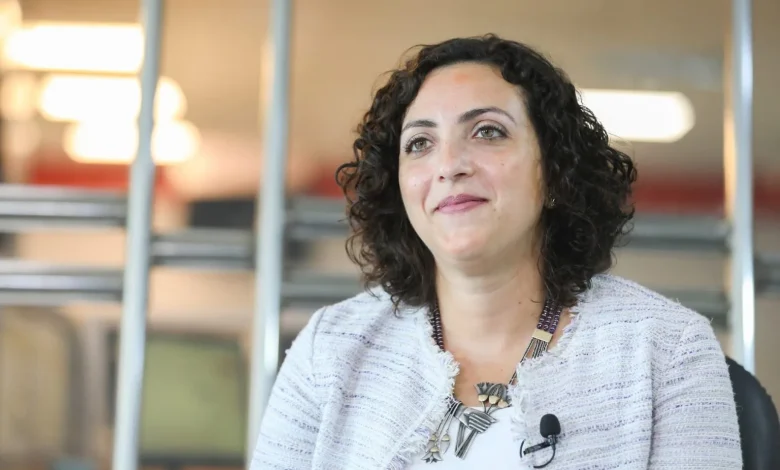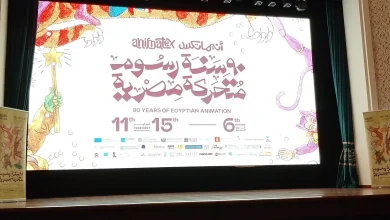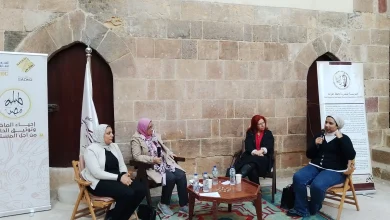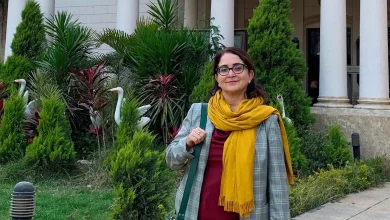
Monica Hanna’s ongoing battle to protect Egypt’s heritage amid online smear campaign
Monica Hanna, the founding dean of the Faculty of Cultural Heritage at the Arab Academy for Science, Technology and Maritime Transport, has recently dominated Egyptian social media after suddenly becoming a trending topic. The surge of attention followed renewed circulation of her past statements, which she has described as part of a coordinated “smear campaign” orchestrated by members of the old guard within Egypt’s antiquities establishment.
The attacks on Monica have not stopped, as it seems that her decision to confront rather than remain silent has provoked adherents of the Kamayta ideology, which is a loose current of Egyptian nationalism that puts ancient Egypt, or “Kemet”, at the center of identity and sees the pharaonic heritage as the primary reference for what it means to be Egyptian today. The attacks on Monica have not subsided, and her choice to confront rather than remain silent appears to have further provoked the group. In their eyes, Hanna is merely a convenient ladder, a mouthpiece to circulate Afrocentric claims that ancient Egyptian civilisation was fundamentally rooted in sub‑Saharan African ethnic origins—claims Monica firmly and repeatedly rejects as historically unfounded.
In response, Hanna has refuted these claims. Here, we discuss all the criticism and accusations directed at her and learn about her vision for managing Egyptian heritage
- You recently described the campaign against you as being led by online troll networks Why do you think that is?
The issue surfaced when the National Council for Women praised my efforts in preserving antiquities. Soon after, I faced a fierce online campaign orchestrated by coordinated groups aiming to damage my reputation without cause. This sparked heated debates, with some supporting and others opposing the attacks. Ultimately, rational voices prevailed, moving beyond the mob mentality that fueled the campaign—most of which I believe was driven by organized online troll groups. For clarity, I do not personally know anyone in the National Council for Women, and I appreciate their recognition while regretting the backlash they faced because of me.
- So who is behind it?
I think there are some people in the archaeological community who are bothered by my views. I have a critical view of the state of Egyptology today. I am not good at “taking the middle ground.” If I see something wrong, I say it is wrong. I propose a way to fix it from my point of view, based on science and heritage management. What matters most to me is completing my research and educating a generation capable of protecting its heritage.
- What is the goal of the smear campaign?
Its goal is to distort my image and take what I write on the “X” (formerly Twitter) out of context. For example, I objected when former Egyptian President Mohamed Morsi threatened Ethiopia. Those who call themselves “Kamayta” tried to recirculate what I wrote during that critical period and present it as if I were against the Egyptian state or taking the side of the Ethiopians.
- How did you receive the criticism directed at your writings in recent days?
I view it from a researcher’s perspective and try to understand their point of view. Still most of what was written at the beginning of the campaign amounts to insults, slander, bullying, and abuse, and I have taken legal action against them.
- I repeat the question… In your opinion, who is behind the campaign?
The answer is clear and well-known: there are individuals deliberately attempting to tarnish my reputation and cast me in a negative light. I plan to soon name them and provide supporting evidence, as some have even caused harm to the cultural heritage of this country.
- Why do you provoke them?
Because I am “not holding back” and “not in the business.” I write freely as a researcher and specialist, and I participate in discussions with specialists, academics, and young archaeologists in order to nurture a new generation capable of preserving and protecting Egyptian heritage according to contemporary scientific and research standards.
- What are the mistakes of the past that you are talking about? I want us to be clearer, so that everyone understands the nature of the issue. There is a point that concerns a large group of people interested in archaeology, which is the dispute between you and Dr. Zahi Hawass, as you often clash via newspapers, television, and social media. What is the nature and cause of the dispute?
I have no personal dispute with Dr. Zahi Hawass but we represent different generations and visions for Egypt’s heritage. We both seek to move beyond the outdated guardianship system that has failed to give Egyptian antiquities the recognition they deserve—both locally and internationally. As a result, archaeology has suffered decline, and the conditions for archaeologists and the preservation of antiquities have worsened. I believe that through collective institutional efforts, it would have been possible to develop a genuine vision for managing Egypt’s heritage and moving away from giving priority to everything foreign at the expense of the Egyptian.
Furthermore, the reproduction of the colonial theory that we are trying to critique is unacceptable. We cannot continue to view Egyptian heritage through Western eyes.
- However, to his credit, during his time working in archaeology, he was able to train and send many young archaeologists to study Egyptology at the world’s most prestigious universities.
These are good things, but what were they able to change the system within the archaeological sites where they worked? Only a few were able to apply what they learned abroad.
- But he left his position in archaeology more than 10 years ago. Why should we blame him for the continuing situation?
Dr. Zahi still controls the Supreme Council of Antiquities and continues to run things behind the scenes.
- Among the accusations recently levelled against you is that you are trying to question the link between genes and culture; that is, that we, as Egyptian nationals, may be the product of the intermingling of other civilisations. How do you view this issue?
These people fail to grasp that academic science has the right to present its views. They resemble the Muslim Brotherhood in their mindset: “Whoever is not with us is against us.” The harassment I face will not make me retreat or change my beliefs. I reject their populist rhetoric that stirs emotions without any scientific basis, fueled instead by an unhealthy obsession with ancient Egypt.
- In your book “The Future of Egyptology” you hinted at the need for Global South countries to unite against the Global North. Do you think this is a call to promote Afrocentric ideas?
Afrocentrism is primarily an American intellectual and cultural movement rather than an indigenous African idea. It originated among African American scholars and activists as a response to Eurocentric narratives that sought to erase or diminish African history. While African countries have adopted aspects of Afrocentrism, its roots lie in addressing racial and cultural issues within the United States. Colonialism attempted to deny Africa’s historical significance, even though much of African heritage is housed in European museums. Therefore, reclaiming African heritage remains a crucial task. I believe that Afrocentrism as a theory is gradually declining due to ongoing scientific research and scholarship, rather than because of coordinated campaigns, unlike Orientalism as a theory, which has managed to endure.
- So you believe that the civilizations of the South may share some characteristics, such as the ancient civilizations of Pharaonic, Phoenician, Nubian, Aksum in Ethiopia, and others?
Certainly, some commonalities unite these civilisations. We all need to work together to reclaim our looted artefacts. Egypt must lead a real revolution, together with other African countries, to recover the looted heritage of the South from European museums, including the heritage of Arab countries such as Iraq. Decisive decisions must also be taken in this regard, and I believe that the Arab League should also play a role in Egypt, Iraq, Syria, and Yemen to recover our looted heritage.
- Among the accusations against you is the refusal to acknowledge the concept of genetic purity. Is this concept even relevant or acceptable to discuss in the 21st century?
The idea of genetic purity is not scientifically proven and cannot be relied upon. Egyptian civilization does not need it to prove its value and importance. This is because the countries of the South are genetically similar across very large areas. We share many similarities with Africa. There is no such thing as “race.” It is an identity concept launched by colonial countries to justify slavery and racial superiority.
But what matters to me is that there is an Egyptian culture, and this culture or civilization has absorbed all cultures regardless of the geographical nature of these people. The idea of racial purity was born to divide peoples and civilizations into artificial identities. I believe that part of affirming our identity is to get rid of the idea of “foreign control” over Egyptian heritage, whether academically or even at the level of the general public’s awareness of and interaction with our heritage. Genetic convergence is an exclusionary idea and can never be generalized.
I believe that we will regain our identity when we open the Grand Egyptian Museum to Egyptians, not foreigners. Our Egyptian identity will not be restored by promoting exclusionary, condescending rhetoric.
- I think the writer Ahmed al-Derini referred to this when he recently wrote on Facebook that organized groups on social media are their own hell, as the “Kamayta” are on par to the Islamists, because they are groups that can turn the lives of those who disagree with them into hell. How can we confront these phenomena?
I certainly agree with him. These people want to apply their own laws. Therefore, I hope that the state will take action against those who promote exclusion. I also call on the state to track down those who lead these committees. We want to celebrate ancient Egypt and interact with it, but in ways that do not rely on violence, terrorism, or intimidation. We still don’t know who is behind these groups of trolls. They are usually described as “state sponsore trolls” But in reality, they work against the state and against the national interest. This exclusionary discourse will have a very bad end for the cohesion and unity of Egyptian society.
- You are also calling for the restructuring of heritage management in Egypt. In your opinion, how is heritage currently managed?
Egyptian heritage management exists in completely isolated silos. If there were real management, what we saw at the Grand Egyptian Museum would not have happened, where Egyptians were prevented from entering and tickets were restricted to foreign visitors. Heritage management is a specialized science that remains underdeveloped in our country , making it imperative that we prioritize its study and application as soon as possible to safeguard and sustain our cultural legacy.
- There are rumors that you are not a specialist in Egyptian antiquities, that you write outside your field of expertise, or that what you write are just “posts” on Facebook. What is your response?
These opinions did not bother me. What really bothers me, aside from these rumors, is that some specialists are taking advantage of this moment to express critical opinions about me. They are exploiting the campaign, to the extent that one of them decided to buy my book a few days ago in order to offer a critical review of it. If it weren’t for the campaign, would he have kept his critical opinion to himself for years until the opportunity arose?
As for my specialization, I graduated from the American University in Cairo with a degree in Egyptology and Archaeological Chemistry. I then obtained my PhD from the University of Pisa on the documentation of wall inscriptions in Thebes.
- Finally, what is your vision and aspirations for Egyptian heritage in the coming years?
What has happened has prompted many people to engage with my writings and the vision I have been presenting for years, which remains my foremost priority. I have received numerous messages inquiring about Egyptian heritage and civilization, with people seeking reliable sources to deepen their understanding. This enthusiasm for knowledge is the highest aspiration for any researcher. I dedicate my days to meticulously studying documents and archives on Egyptian antiquities and civilization both within Egypt and internationally, in search of historical records that strengthen the efforts of the Egyptian state and committed archaeologists working tirelessly to recover looted artifacts displayed in museums around the world.




